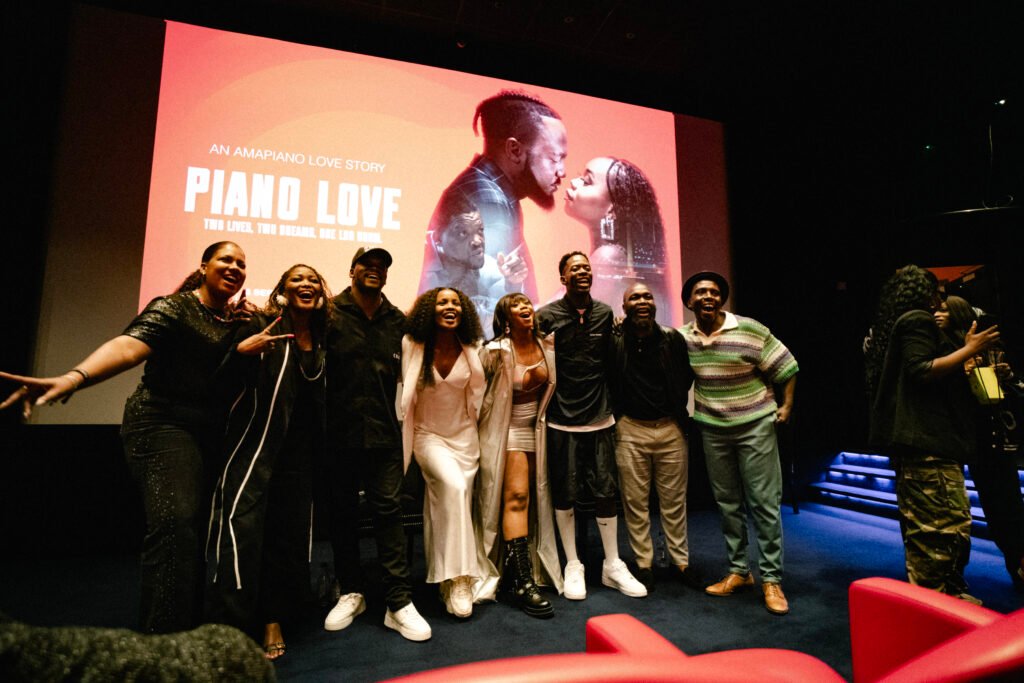In the new Netflix release, Piano Love, seasoned South African artist and filmmaker Mandla N takes centre stage to tell a story that hits close to home. With roots in the music scene through his work with Gang of Instrumentals, he shifts gears to the film world with a narrative that mirrors his own journey—one of reinvention and staying true to your voice, even as the culture around you evolves. “The inspiration comes from my own life story,” says Mandla N. “I used to do a lot of music back in the day with my band, Gang of Instrumentals. But as time passed and music took a backseat, I had to ask myself, ‘What’s next?’ That’s how I transitioned into film. I never allowed myself to be a victim of circumstance. I kept it moving.”
This project, steeped in the sounds and rhythms of Amapiano, is a powerful reflection of the highs and lows artists face—not just in South Africa, but globally. After a private screening recently in London, we sat down with Mandla N to talk about how his experience in music naturally led to this cinematic endeavour, the challenges of ownership, the reality of navigating the music business, and what it’s like to create a film that speaks to a global audience.
With a cast featuring Kwesta Dakar and Bontle Modiselle, and a soundtrack that includes 28 musicians, this film promises to be a bold statement on what it means to own your craft and stay authentic in a fast-moving industry.
Rolling Stone Africa: Hi Mandla. Thank you for inviting us down to watch your new movie, Piano People. It was a gripping watch. For those yet to see it, please give us some background on the inspiration behind the film.
Mandla N: The inspiration comes from my own life story. I used to do a lot of music back in the day with my band, Gang of Instrumentals. But as time passed and music took a backseat, I had to ask myself, “What’s next?” That’s how I transitioned into film. I never allowed myself to be a victim of circumstance. I kept it moving! I never sat back and allowed myself to be a victim. It’s exactly my story, where you look at it and you say, “you don’t have to change your voice to be part of a moving culture, to be part of what Amapiano is today. You just have to bring yourself.” And that’s exactly what I did. That’s what inspired me.
For me, the most memorable experience was in making that decision to go, “Guys, we’ve got something special here. How do we export it? Let’s premiere in London!” And that decision got us here today. Even now, having this interview with Rolling Stone Africa. Man! This is a huge look for us. So I’d say I’m still in that moment, and these memorable moments are coming over and over, and every single day I’m just living and going through them.
I’ve been in the business for a very long time, so I understand how to shoot for edit. I’m a director who shoots for edit. I understand the types of shots I want. Pre-prod is also a big thing. You plan so that everything goes the way you plan, so that when you approach the film, you know exactly who the actors are going to be, and also have an amazing team. I’ve got a really, really great team, and that’s why we could do it in eight days.
Absolutely: we’ve got Kwesta DaKar and Bontle Modisille leading the cast.
I think ownership is a huge thing, especially when we were licensing the music. We realised that South Africans, or even African musicians and artists, don’t own their work—it’s owned by huge labels and international labels. So, for us, ownership is extremely important. And we feel it’s the beginning of what’s to come. We’re inspiring people to own their work, own their IP, because it’s what’s going to get them, get their kids, and their kids’ kids paid and living through their art.
The film is out on Netflix on September 6, globally. We’re quite excited; we’re promoting it heavily in South Africa because it’s obviously the entry point, and then throughout the world.
We really, really appreciate the support and we wouldn’t be here without the world just embracing us as South Africa, as Africa. Our story is their story—it’s not really separate like that. We are part of their story and their culture. We’re all part of a shared narrative, and in 50 years, it’s going to be everyone’s story—not just mine.








